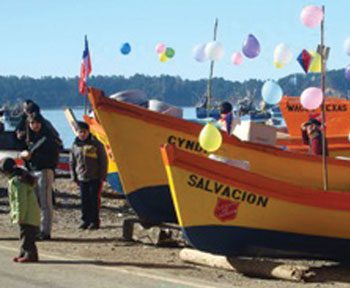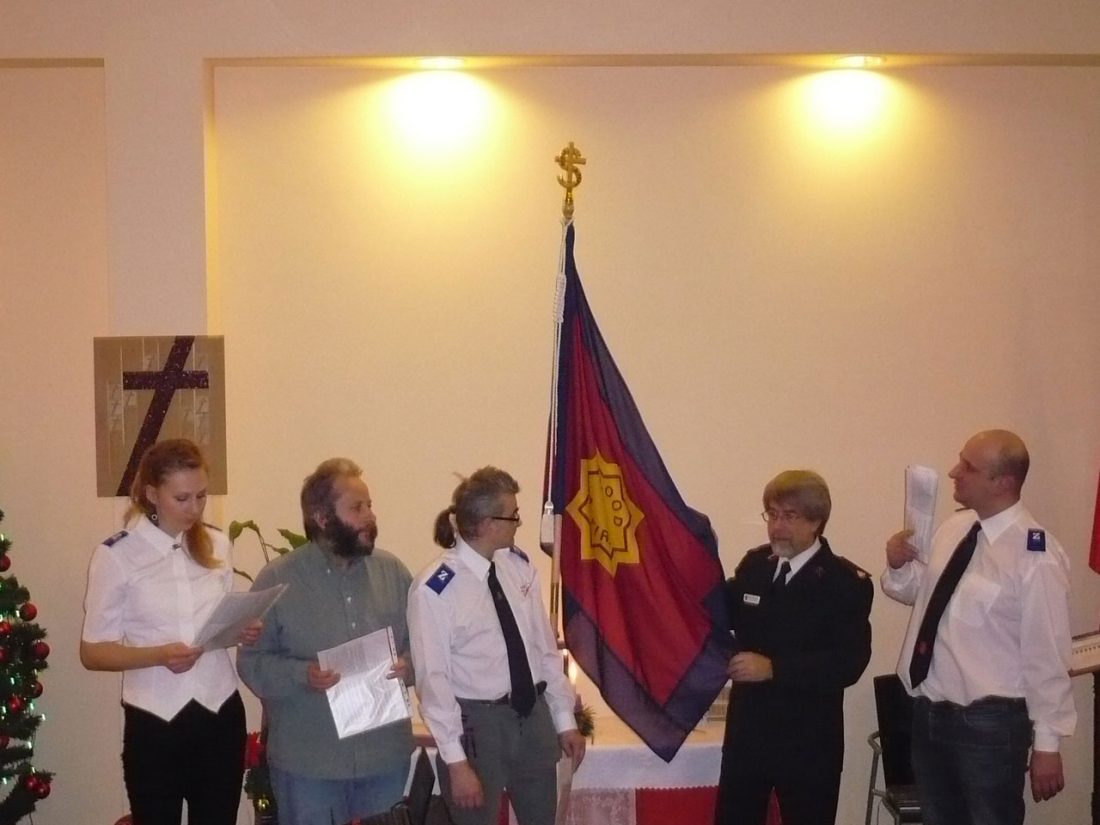Listen to this article
Listen to this article
Loading
Play
Pause
Options
0:00
-:--
1x
Playback Speed- 0.5
- 0.6
- 0.7
- 0.8
- 0.9
- 1
- 1.1
- 1.2
- 1.3
- 1.5
- 2
Audio Language
- English
- French
- German
- Italian
- Spanish
Open text
international leaders recommend approval of survey response. expect big changes. on behalf of general john gowans, commissioner john larsson, chief of the staff, has released the following information on the worldwide response to the 28 recommendations of the international commission on officership. “mori has completed its analysis of the responses received, and the results were presented to, and discussed by, the international conference of leaders in atlanta prior to the international millennial congress,” larsson said. “the general will now reflect on the great amount of information and advice he has received before reaching decisions on these recommendations.”. response rate. the response rate–the number of officers who completed forms out of the total number of officers globally and zonally–was “one of the best responses mori has seen for a survey of this kind.” in all, 12,653 forms were received by mori. this represents a global response of 50%. but 653 forms arrived too late for analysis in time for the international conference of leaders and the survey is therefore based on 12,000 responses. in round terms, 9,000 of the responses came from active officers and 3,000 from retired officers–75% and 25% respectively. one of the findings of the survey is that, on most subjects covered by the 28 recommendations, active and retired officers on any given geographical zone hold similar views. consultation findings. an extract from the mori report follows. this presents the findings of the consultation in some detail and discusses areas of agreement and disagreement among the various categories of respondents around the world. in round terms, the results were:. six of the recommendations were endorsed by nine out of every ten respondents. these are the recommendations dealing with leadership development, women’s ministry: appointments, single officers, cultural relevance, strengthening and enriching officer service, and the recommendation that the rank system be reviewed. these recommendations were endor-sed globally and individually by all zones. twelve of the recommendations were endorsed by eight out of every ten respondents. these are the recommendations dealing with leadership models and structures, the officers’ covenant and undertaking, appointing younger leaders to decision-making bodies, women’s ministry: membership of boards and councils, international and territorial commissions for ongoing work on officership issues, support if an officer resigns, an international symposium regarding leadership development, other models of spiritual leadership, portable pensions, and the appointing process. these recommendations were en-dorsed globally and individually by all zones. six of the recommendations were endorsed by seven out of every ten respondents. these are the recommendations dealing with marriage regulations: engagement, partner moving into officership and allowances, revision of age requirements for officer service, termination grant, appointing younger leaders to executive responsibility. these recommendations were endorsed globally and individually by all zones. two recommendations were endorsed by six out of every eight respondents. the first of these is the recommendation dealing with marriage regulations: spouse moving out of officership. this was endorsed globally and individually by all zones, but the retired officers in south asia expressed reservations. the second recommendation deals with the concept of officership not necessarily being a lifetime commitment. this was endorsed globally and individually by all zones. two recommendations were endorsed by five out of every ten respondents. the first of these–the recommendation that territories be permitted to experiment with the “tent maker” concept–received a global “agree” response of 53%, all zones endorsing the recommendation except north america. the second recommendation–that territories be given the option of officers being married to non-officers–received a global “agree” response of 50%, with 43% disagreeing. there were some zonal variations. africa, north america, and south asia disagreed. with this recommendation there was also a difference of view between active and retired officers. globally, 52% of active officers agreed and 41% disagreed. globally, 43% of retired offices agreed and 47% disagreed. in summary. all of the 28 recommendations were endorsed globally: most of them by a substantial margin. in the case of the two recommendations that received the lowest margin of support, one zone disagreed about the first, and three zones disagreed about the second. the rank system. the recommendation that the rank system be reviewed received the endorsement of 90% of officers. three options were given (a) minor modifications to the present system, (b) all officers to hold rank of captain (except the general), and (c) all ranks to be based on years of service. the third option (c) received the strongest endorsement globally–with about twice as many endorsements as either of the other two options–but the concept of all officers holding the rank of captain received majority support in the south pacific and europe–united kingdom. finally. “the general wishes me to thank each of you who took part in this consultation, and to thank everyone who had a part in the translation and distribution of the report and the consultation form,” said larsson. “the general is also grateful for the almost 500 letters he received in connection with the consultation. “we must now pray that god will guide the general as he further considers these matters, and that a plentiful supply of the ‘wisdom from above’ may be his.”. chart a geographical zones the response rate, geographical zone by geographical zone, was as follows:. zone africa 56% east asia 54% south pacific 52% north america 50% latin america caribbean 42% europe-united kingdom 41% europe-continental 39% south asia 34%. chart b breakdown of the 12,000 responses of the 12,000 responses, the number of forms received from each geographical zone (expressed as a percentage) was as follows:. zone africa 56% east asia 54% south pacific 52% north america 50% latin america caribbean 42% europe-united kingdom 41% europe-continental 39% south asia 34%
Open context player
Close context player
Plays:-Audio plays count
international leaders recommend approval of survey response. expect big changes. on behalf of general john gowans, commissioner john larsson, chief of the staff, has released the following information on the worldwide response to the 28 recommendations of the international commission on officership. “mori has completed its analysis of the responses received, and the results were presented to, and discussed by, the international conference of leaders in atlanta prior to the international millennial congress,” larsson said. “the general will now reflect on the great amount of information and advice he has received before reaching decisions on these recommendations.”. response rate. the response rate–the number of officers who completed forms out of the total number of officers globally and zonally–was “one of the best responses mori has seen for a survey of this kind.” in all, 12,653 forms were received by mori. this represents a global response of 50%. but 653 forms arrived too late for analysis in time for the international conference of leaders and the survey is therefore based on 12,000 responses. in round terms, 9,000 of the responses came from active officers and 3,000 from retired officers–75% and 25% respectively. one of the findings of the survey is that, on most subjects covered by the 28 recommendations, active and retired officers on any given geographical zone hold similar views. consultation findings. an extract from the mori report follows. this presents the findings of the consultation in some detail and discusses areas of agreement and disagreement among the various categories of respondents around the world. in round terms, the results were:. six of the recommendations were endorsed by nine out of every ten respondents. these are the recommendations dealing with leadership development, women’s ministry: appointments, single officers, cultural relevance, strengthening and enriching officer service, and the recommendation that the rank system be reviewed. these recommendations were endor-sed globally and individually by all zones. twelve of the recommendations were endorsed by eight out of every ten respondents. these are the recommendations dealing with leadership models and structures, the officers’ covenant and undertaking, appointing younger leaders to decision-making bodies, women’s ministry: membership of boards and councils, international and territorial commissions for ongoing work on officership issues, support if an officer resigns, an international symposium regarding leadership development, other models of spiritual leadership, portable pensions, and the appointing process. these recommendations were en-dorsed globally and individually by all zones. six of the recommendations were endorsed by seven out of every ten respondents. these are the recommendations dealing with marriage regulations: engagement, partner moving into officership and allowances, revision of age requirements for officer service, termination grant, appointing younger leaders to executive responsibility. these recommendations were endorsed globally and individually by all zones. two recommendations were endorsed by six out of every eight respondents. the first of these is the recommendation dealing with marriage regulations: spouse moving out of officership. this was endorsed globally and individually by all zones, but the retired officers in south asia expressed reservations. the second recommendation deals with the concept of officership not necessarily being a lifetime commitment. this was endorsed globally and individually by all zones. two recommendations were endorsed by five out of every ten respondents. the first of these–the recommendation that territories be permitted to experiment with the “tent maker” concept–received a global “agree” response of 53%, all zones endorsing the recommendation except north america. the second recommendation–that territories be given the option of officers being married to non-officers–received a global “agree” response of 50%, with 43% disagreeing. there were some zonal variations. africa, north america, and south asia disagreed. with this recommendation there was also a difference of view between active and retired officers. globally, 52% of active officers agreed and 41% disagreed. globally, 43% of retired offices agreed and 47% disagreed. in summary. all of the 28 recommendations were endorsed globally: most of them by a substantial margin. in the case of the two recommendations that received the lowest margin of support, one zone disagreed about the first, and three zones disagreed about the second. the rank system. the recommendation that the rank system be reviewed received the endorsement of 90% of officers. three options were given (a) minor modifications to the present system, (b) all officers to hold rank of captain (except the general), and (c) all ranks to be based on years of service. the third option (c) received the strongest endorsement globally–with about twice as many endorsements as either of the other two options–but the concept of all officers holding the rank of captain received majority support in the south pacific and europe–united kingdom. finally. “the general wishes me to thank each of you who took part in this consultation, and to thank everyone who had a part in the translation and distribution of the report and the consultation form,” said larsson. “the general is also grateful for the almost 500 letters he received in connection with the consultation. “we must now pray that god will guide the general as he further considers these matters, and that a plentiful supply of the ‘wisdom from above’ may be his.”. chart a geographical zones the response rate, geographical zone by geographical zone, was as follows:. zone africa 56% east asia 54% south pacific 52% north america 50% latin america caribbean 42% europe-united kingdom 41% europe-continental 39% south asia 34%. chart b breakdown of the 12,000 responses of the 12,000 responses, the number of forms received from each geographical zone (expressed as a percentage) was as follows:. zone africa 56% east asia 54% south pacific 52% north america 50% latin america caribbean 42% europe-united kingdom 41% europe-continental 39% south asia 34%
Listen to this article














